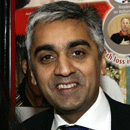Questions and Answers
Through a collection of video clips, cardiologist Professor Sanjay Sharma (right) has answered some of the most frequently asked questions (FAQs) about young sudden cardiac death and heart screening.
These questions are split into sections below. Click on any question to open a new window where you can hear (and read) Professor Sharma's response.
Q&A sections
Background information on CRY's screening programme Family history and medical concerns
Who can / cannot be screened by CRY? After having an ECG
If something is identified Where / how else to get tested
Information about risk; further cardiac tests; terminology… Watch CRY Patron David Walliams being screened
Background information on CRY's screening programme
What is sudden cardiac death?
What is SADS?
How important is expertise?
Does playing sport cause sudden cardiac death?
Why get tested? I am told there is nothing you can do for me if I am identified.
What test will I have and how long will it take? What will they be looking for?
Who will be reading my test?
Do these tests identify all people at risk?
What are the chances of having something wrong?
Do I need to bring anything with me for the test?
How many people need heart scans?
My daughter only wants to see a female technician. Can this be arranged?
Once I have been screened will I need to be screened again?
Will I be able to talk to a cardiologist on the day?
back to top
Family history and medical concerns
You mention there are sometimes symptoms. How important are symptoms?
I have a family history of high blood pressure. Does that matter?
What if I have a family history of familial hypercholesterolemia?
What if I have a family history of ischemic heart disease?
When I was younger I was told I have a heart murmur. Does that matter?
A family member has a cardiomyopathy. Does this mean it will be passed on to me?
If someone is overweight are they more at risk from these conditions?
back to top
Who can / cannot be screened by CRY?
I'm over 35. Can I be screened?
Why doesn't CRY screen people over 35?
My child is 14. Can he / she be screened?
Why doesn't CRY screen people under 14?
Can I have an ECG if I'm pregnant?
If I don't do much sport will I still be able to get tested?
Can I still have the test if I have a hangover?
back to top
After having an ECG
What happens if something is found on my ECG?
Why do I need a heart scan?
My ECG is normal but I still have symptoms. What should I do?
After looking at my ECG the doctor now wants to do an ECHO, is something wrong?
My son / daughter needs a repeat. Should I be worried?
Why are some people asked to have an ECHO?
back to top
If something is identified
What will happen if I am found to have a condition?
Will I have to stop playing sport?
If something is found, how will this affect insurance or mortgages?
Is every condition you find curable?
Will my doctor be kept informed?
back to top
Where / how else to get tested
Can I get the same tests done locally, privately?
Can I get this done on the NHS?
Can my GP do the test?
If I need to be referred, do I have to travel to London?
I'm over 35. Where can I get tested?
My GP doesn't take my concerns seriously. What can I do?
back to top
Information about risk; further cardiac tests; terminology…
Screening identifies risk. Are there different levels of risk?
What can be learned from an MRI scan, exercise test, Holter monitor (24 hour ECG)?
What does it mean to be a carrier?
Are there certain sports which are pre-disposed to long QT?
Can I book an exercise stress test?
I've heard about CPR. Could you explain how this is effective in dealing with sudden cardiac death?
Should I book an ECG and ECHO? Why is there a choice of services?
Would the ECHO pick up anything the ECG would miss?
Why is it recommended that elite athletes have both an ECG and an ECHO?
What is an ICD? What does it do?
Why aren't all schools equipped with a defibrillator?
back to top
SCREENING means having:
An Electrocardiogram (ECG), which looks at the electrical conduction pathways around the heart. Small stickers known as electrodes are placed on the client's chest and the wires connect to an ECG machine whilst you lie still. A printout of the hearts electrical activity is obtained for evaluation by the cardiologist. This test is painless, non-invasive and takes a matter of a few minutes to perform
An Echocardiogram (Echo) is an ultrasound test (such as offered to pregnant women) which looks at the structure of the heart. From the information provided on screen, measurements are taken which give a guide to muscle thickness and size of the chambers of the heart. Again, this test is non-invasive and painless and takes approximately 20 minutes to perform.
The tests are performed with the client lying down on a couch or bed. For both tests clients will need to be undressed to the waist.






